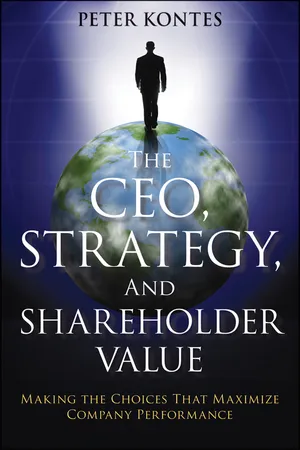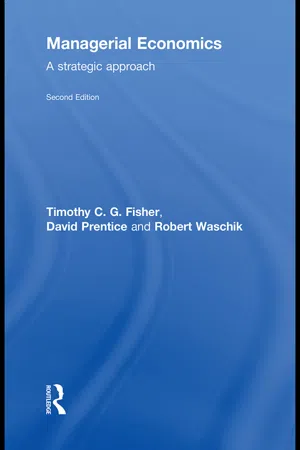Economics Of Effective Management
The economics of effective management refers to the principles and strategies used to optimize resources and achieve organizational goals. It involves making efficient use of available resources, such as labor, capital, and technology, to maximize productivity and profitability. This approach emphasizes the importance of cost-benefit analysis, strategic decision-making, and effective allocation of resources to drive business success.
3 Key excerpts on "Economics Of Effective Management"
- eBook - ePub
- Guy Callender(Author)
- 2008(Publication Date)
- Routledge(Publisher)
...Such data may not be noticed by the average taxpayer but the evidence suggests that managers believe their outsourcing decisions are improving total labour productivity in their organizations when the labour, management and control pictures are quite different. Yet deeper-seated extensions of this efficiency dissonance exist. While markets seek financial efficiency and enhanced shareholder wealth, the same markets permit senior executives to draw significant salaries which seemingly reflect little connection to efficient management outcomes. The study found an absence of comprehensive academic analysis of the notion of efficiency over the past 50 years. The literature review suggests that the absence of comprehensive research has meant that the precise nature of the notion of efficiency has never been articulated within the context of management practice. The absence of detailed enquiry has left the way open for alternative definitions of efficiency to emerge without challenge in management discourse. As a consequence, management practice, in relation to efficiency, is informed by an economics-based definition rather than one which has been rigorously interrogated within the management discipline. Furthermore, at an expanded macro-level, the discussion of efficiency has shown a neglect of the operational implications of the term within management practice. In an era of extensive globalized competition, the absence of rigorous application of efficiency principles and the persistent application of the economics notion of the term may mean that management decisions designed to improve organization performance are undertaken on the basis of a least cost model rather than a performance efficiency basis. Implications for the practice of management So, the notion of efficiency has become a descriptive term which possesses very limited operational meaning...
- eBook - ePub
The CEO, Strategy, and Shareholder Value
Making the Choices That Maximize Company Performance
- Peter Kontes(Author)
- 2010(Publication Date)
- Wiley(Publisher)
...CHAPTER TWO The Economics of Strategic Management BUSINESS STRATEGY MUST BE about achieving concrete, measurable, and important economic objectives. Yet most of the theory and practice of business strategy lacks a sound economic foundation. The strategy literature contains strong presumptions, stated and unstated, that by pursuing certain seemingly desirable goals, such as increasing customer satisfaction or achieving economies of scale, good or improved economic results for the business will naturally follow. Unfortunately, many of these widely accepted presumptions are myths: unproven, unreliable, and often incorrect guides to good strategic decision making. The purpose of this chapter is to demonstrate the link between economic profit and strategy, to highlight some of the most common strategic myths, and to lay an economic foundation for making the best strategic management choices. ECONOMIC PROFIT As noted in the Introduction, economic profit, or EP, is a simple concept, defined as earnings minus a charge for the equity capital employed to generate those earnings. Exhibit 2.1 shows a general example of how economic profit would be calculated for a single business unit. EXHIBIT 2.1 Economic Profit (EP) Calculation Big Dog Business Unit Key Data Earnings $ 1.2 billion Equity employed $10.0 billion Cost of equity capital 10% Calculations Earnings $ 1.2 billion Capital charge –$ 1.0 billion [Capital charge: $10.0 billion ×.10] ECONOMIC PROFIT $ 200 million This economic profit calculation is the dollar amount by which the business unit’s annual earnings exceed the return on capital required by investors who assume the risk of supplying the equity used in the business...
- eBook - ePub
Managerial Economics
A Strategic Approach
- Robert Waschik, Tim Fisher, David Prentice(Authors)
- 2010(Publication Date)
- Routledge(Publisher)
...Managerial Economics, Second Edition Traditional microeconomic theory has much to offer a manager. It suggests ways to increase profits by setting prices and packaging services, using advertising to increase demand and shows how internet auction sites like eBay affect competition and profitability. By using game theory to present and solve a manager’s decision-making problems and by focusing on the strategic nature of these problems, this text makes microeconomic theory much more intuitive and relevant for the business student. The text is separated into four parts: I Basic microeconomic theory of the firm and the basic tools of game theory. II Problems related to the strategic interaction between firms, including price and quantity competition and product differentiation. III Issues arising from strategic interactions within the firm, including vertical and horizontal integration, training and motivating workers, and labour unions. IV Marketing economics including information problems, advertising, durable goods and the product life cycle. This book will be suitable for any student with a background of introductory economics. The authors include a variety of international examples and case studies from the business world to expand and illustrate key concepts, and provide end-of-chapter exercises to test students’ grasp of the material. An online supplement comprising of problems and solutions as well as PowerPoint slides is available for lecturers. Visit the companion website at www.routledge.com/textbooks/9780415495172 Timothy C. G. Fisher is Associate Professor of Economics, University of Sydney, Australia. David Prentice is Senior Lecturer, School of Economics and Finance, La Trobe University, Australia. Robert Waschik is Senior Lecturer, School of Economics and Finance, La Trobe University, Australia. Managerial Economics A strategic approach Second Edition Timothy C. G...


